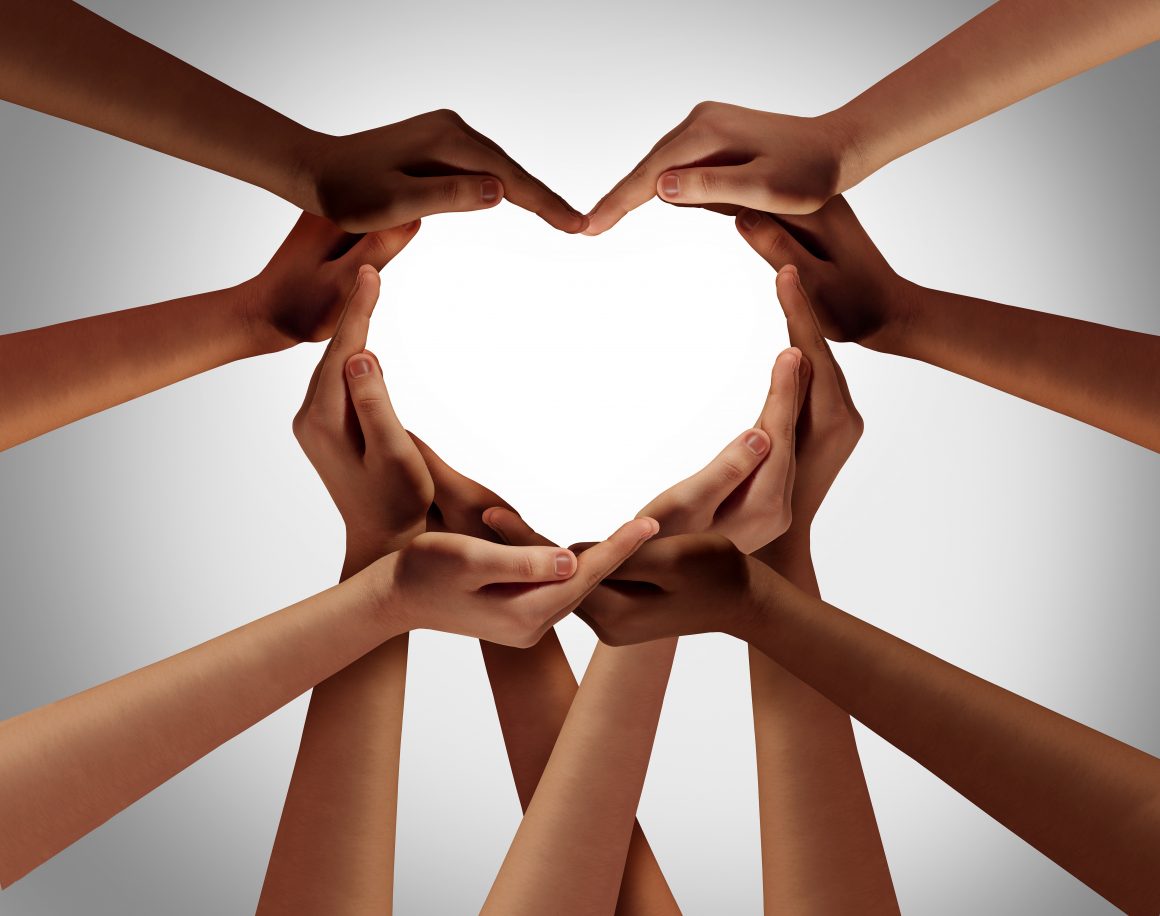
An HSP on What Strength Means
It feels like a splintered wooden skewer is winding its way up, slowly and methodically piercing through my intestines as it insinuates its way toward my throat.
I’d been gazing out the bus window lost in reverie but have been brought into the present moment by this feeling.
I’m on my way to my second appointment with my therapist and the landscape has been passing by in a blur.
“Oh, wonderful. Ok, well here’s an opportunity to not use my logical thinking brain and instead let my heart teach me something,” I say to myself silently.
“Okay, deep breath in, (pause) deep breath out.”
Relaxing, I feel into what I’m feeling.
Uncomfortable.
Anxious.
Why? I ask myself as I place my hand on my heart and gently apply pressure.
Listening.
Ah. Because I’m reaching out for help and I’m afraid of being judged. That’s what this is about. Feeling judged.
“Do you accept yourself?” I silently ask.
“Yes.”
“Do you let go of any expectations you have of yourself?”
“Yes.”
“Are you letting go of blame and embracing forgiveness?”
“Yes”.
“Do you know how precious and wonderful you are?”
Smiling, my eyes start to blur with tears of thankfulness.
“Yes.”
And I feel the skewer slowly unwinding, spiralling down, my intestines relaxing, and soon that uncomfortable feeling is gone.
I’ve had to be tenacious to continue to follow up and receive an appointment with a therapist, weaving my way through invisible webs of inter-connected and sometimes unconnected organizations.
Thankfully I’ve reached the point where I feel like I’m receiving the help I need. The mental health support that’s helping me learn how to work with and through depression and anxiety.
Why has this process been challenging for me?
Because it feels to me like the recurring message I’ve received throughout my life was that my role was to help others.
A role I was genetically predisposed to and then seemingly groomed for. The message I received loudly and often was I wasn’t to make waves, cause a problem or need help.
I was to be the one who calmed the waves, gave the help, and solved the problem.
It didn’t matter “what” the problem was, it was my job to “help” make the problem go away or at the very least minimize the problem. If that didn’t happen then I’d failed and others pain and shame were projected onto me. Not happy feelings to have so I did everything I could to avoid that.
It was somehow a given that I was “strong” enough to do this consistently and that I had the tools to negotiate unmanageable waters, and concurrently I was to exhibit longevity.
And it wasn’t an option that I’d be unable to figure out a solution to a problem.
Growing up in what psychologists would perceive as a chaotic environment (there is no blame to be assigned here, our parents do the best they can with what they have) meant I wasn’t given the tools to deal with these problems, instead I was given a lot of opportunities to fix problems, and given a lot of opportunities to become “strong”.
So I did become “strong”. I became very self-reliant.
But the downside was I also got good at making excuses for others’ bad behaviour, sweeping things under the rug that weren’t mine to sweep and in actuality needed to see the light of day, accepting responsibility for situations that really had nothing to do with me, and generally had “too much” empathy for others.
Because I learned if I didn’t do this I’d be labelled as “too sensitive” or a trouble-maker. So I became very self-reliant because the message I kept receiving was “you aren’t to ‘need’ anything”, you are to “give”.
Where did this land me?
Right now it means I’ve landed in the middle of a turning point, a turning point that’s presented me with the opportunity to challenge this belief, this belief that I need to always be “strong”.
Ironically this turning point came in the form of a mental health diagnosis.
Five months ago I was diagnosed with anxiety and depression. I’m not sure I agree with this diagnosis though, or that it’s a long term thing, but I do believe there’s valuable information, wisdom to be gained here. There’s a reason this has come up for me at this point in my life, and it’s something I need to pay attention to.
I believe I’ve had some of the symptoms of anxiety and depression to some extent most of my life but like most HSPs I’d been silently struggling. Like most HSPs I wasn’t taught what these terms meant or how to mitigate them. Like most HSPs I went through life undiagnosed, probably because I was very good at putting on a façade, a skill I was taught at an early age.
But I’m learning how common these two mental health conditions are. No, people don’t talk about them a lot, but they’re starting to.
And thankfully while researching the HSP Trait I’ve read a lot articles on the high incidence of depression and anxiety and their link to creativity and the HSP Trait so I felt more prepared emotionally and psychologically to accept that, for me, the possibility may exist that this may or may not be part of the deal that goes with having the HSP Trait.
That my mental health is something I need to pay particular attention to, far more than I have in the past.
I’d never learned about mental health in school and have only recently begun learning about how our family of origin can have more of an impact on an HSP. We are the creatives and the feelers and are usually considered to be the black sheep of the family. Making us feel even more alienated.
Regardless, after receiving the diagnosis and recovering from an initial bout of shock I began to feel into the opportunity it was.
It was an opportunity to look at what the diagnosis really meant for me and what I could do about it.
And I began looking at it like someone who owns a Maserati car.
If you own this type of car you know you have to take this type of car to a specialist, not every mechanic can work on this car. You also know this car takes special gas and fluids and it requires a certain type of maintenance schedule in order for this vehicle to function at full capacity.
So I took my mental health diagnosis and my HSP Trait and applied it to the concept of caring for a Maserati, and like a mechanic I began working out what would work for my “system”.
I already had a daily meditation practice and have for quite a while. I eat fairly clean, exercise daily, make sure I get some sun on my face, enjoy several creative hobbies, and have been setting healthy boundaries.
I’d done a foray with prescription pills my doctor recommended but after trying them realized they didn’t work for me. Which is fine, I’m terrible at remembering to take pills.
So where does that leave me?
Funnily enough, for this introverted, highly self-reliant individual, it means I’m left with no other option but to reach out for help. Go against everything I’ve been taught so far. I’m the “giver” not the “taker” right? I’m the problem-solver. So doing this has been challenging.
I don’t want to “be a bother,” I don’t want to cause anyone to feel uncomfortable, I don’t want to be a “problem” and I don’t want to be the one in “need”.
But what happens when you “have” to be the one in need? When you “have” to reach out for help?
This is where it feels to me a lot of HSPs get stumped and I don’t believe it’s because of ego or pride.
We’ve been taught that our role is to be the “helper”. But sometimes, sometimes we will need to reach out for help, and that’s okay.
It’s okay that I’m being required to re-wire my expectation of myself to be so self-reliant.
It’s okay if I need to talk with a therapist. Talk with my trusted friends. For right now, it’s okay. It means I recognize that right now, this is in my best interest.
And I’m learning that “strength” isn’t about always being “the giver”.
Sometimes strength means you gather your internal fortitude and pull that strength from deep inside of you and refuse to give help, and instead ask for help when you need it, and accept that it’s okay to “receive” help. And it’s okay to keep asking until you receive what you need.
Because now, more than ever, I need to continue recognizing the importance of “playing with the concept I have of myself”; the ways I was taught to be versus the way it feels I’m being enticed to “be” and moving towards.
And as difficult as this has been, it’s also been incredibly validating.
I’m fine to take up space and be where I’m at, struggles and all and its okay to reach out for help. It doesn’t make me less of a person, it doesn’t mean I’m not strong and it doesn’t make me “selfish”.
And I’m learning there are many new ways to work with anxiety and depression, ways that are interesting and allow me to tap into my creativity even more—like Play Therapy and using Play as a tool.
This seems to be complimenting my new-found concept of “playing with the concept I have of my-self.”
Embracing this attitude of play means I don’t have to think of all the variables, to prepare for them, to be “on guard” for them or to be in “serious” mode the majority of the time. As a thinker this is challenging for me. Play is the opposite of serious. But I’m realizing this makes play even more important.
Because there are points in life where you can’t expect yourself to “be” strong or have all the answers. Yes, difficult situations will make you stronger, there’s no doubt. But how strong do you “need” to be?
So I’ve been learning that strength is not about being quiet and struggling alone.
Strength is not dealing with toxic people or environments for the sake of proving to either myself or others that I’m “strong enough”, or “not sensitive”, or a “not a troublemaker”.
Strength is not self-medicating just to be able to feel like I’m “normal” and fit in.
Strength is about reaching out and being vulnerable when I need to.
Strength is about learning how I can be responsible and actively looking after my own mental health.
Strength is about Playing with Life and defining what a fulfilling, meaningful life means for me.
And at times it means I may need to check in to a pit stop and be cared for by my capable pit crew, who I’m incredibly thankful for and who I can be a support to when they need a pit crew member.
How about you? What does the word “strength” mean to you?






2 Comments
Cary Randall
Wow, Rayne this article resonated with me so much. I feel not quite so alone in this struggle. This is exactly what I needed to read today after the last few days I’ve had. Thank you for your honesty! I need to work on building myself a pit crew. I’ll be in yours any time you need!
Rayne Dowell
Hi Cary, you’re welcome and I’m so glad you feel not quite so alone. I hope you do work on building yourself your Pit Crew. 🙂 Thank you for being in mine!